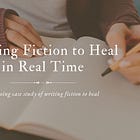If you’re new to The Rebel MFA Way, welcome! This is an essay in my ongoing “Writing Fiction to Heal in Real Time” series where I deep-dive into my writing fiction to heal method as field work and a case study. To begin, I will be working through my story, The Archive, which you can find more information on here.
[NOTE: Your email provider may truncate this essay, be sure to click on “keep reading” to read the entire piece.]
What do you do when you go from “Yeah! Main character energy!” to “Meh… main character energy?”
It seems to happen to me no matter which book or set of characters I’m writing. At some point in the drafting phase, I find myself drawn more to the secondary characters than the main character for a hot second. Usually, I find my way back to my beloved main character but I’m finding it particularly interesting with The Archive because in a lot of ways… Ari is me.
Initially, I was perplexed. Shouldn’t I be more hyped? I mean, this is literally main character energy coming to life!
Yet, ever since Demi entered the proverbial picture, I’ve been thinking about her more and more. She feels mysterious, magical, witchy, fascinating.
While Ari feels… like me.
Last week, I wrote about how we’re both in this liminal space and perhaps that’s what we’re feeling and it’s less about being boring and more about resting before we begin another revelation?
Of course, I turned to the cards for answers and unsurprisingly, I hit on something pretty big (and deep).
When I sat with this card and what it meant for this story, I realized that Demi comes across as unapologetically herself while Ari does not.
This prompted a realization: we're in Ari’s POV, offering a nuanced understanding of her personality, yet it's clear Ari and I are drawn to Demi for the same reasons—she exudes a self-assuredness that Ari seems to lack. Demi knows who she is and she’s not afraid to show it. She’s not afraid to just… be.
This is something I’ve struggled with my entire life. This push/pull of wanting to step into everything that I am without apology. This desire to want to say “fuck you” to anyone and everyone who can’t accept me for who I am.
But alas, that is why I write stories about characters who do that. It’s easier to hide behind, right?
It’s really fascinating to write (subconsciously) and then understand (consciously) how I’m working through these personal issues with my characters beyond what I expect from writing fiction to heal.
I always tell my clients — allow yourself to be surprised by where your writing fiction to heal takes you. You might think you’re addressing one issue, but your characters may lead you to something unexpected and necessary.
This is the beauty and the curse of writing fiction to heal. It doesn’t reveal what you want it to, it reveals what you need to know.
But I haven’t been great about following my advice, eh?
As I mulled over my dilemma, I found myself scrolling through one of my favorite Substackers, Mari Andrew. She had just published an essay titled Why I Write, and it felt like she had crafted it specifically for me. Her words struck a chord, compelling me to reevaluate my own creative intentions.
Mari writes about liberating her creative work from the shackles of persuasion and authority, allowing it to exist purely for exploration. This resonated with me deeply. I realized that I, too, had disentangled my creativity from external expectations—freeing it from the market's grip, genres, and the need for approval. Reading her thoughts reminded me of my core reasons for writing, and how easily they can become distorted when sharing work publicly. It's a delicate dance to maintain that clarity of purpose—close enough to guide me, yet far enough to avoid stifling spontaneity.
She also touched on a creative pitfall that I suddenly recognized in myself: once certainty takes hold of my writing, the adventure comes to a halt. The thrill, as Mari noted, is in uncovering those conclusions through the creative process.
So, how does this revelation weave into writing The Archive and my own transient state?
Demi embodies the unknown, while Ari represents the known facets of myself—until now.
The answer isn't to abandon Ari or hand the spotlight to Demi. It's about rekindling curiosity, viewing Ari's story (and my own) as an unfolding adventure.
Even as I write this, I'm tingling with excitement because it prompts new questions: What mysteries do Ari and I still hold? What am I blind to, and what new terrains await our exploration? How can our fascination with Demi unearth deeper layers within us?
Perhaps the true journey isn't about choosing between the known and the unknown, but about embracing the interplay between them. Ari's story, much like my own, is a testament to the evolving nature of self-discovery, driven by both the comfort of the familiar and the allure of the unfamiliar.
In the end, writing The Archive isn't just about chronicling a fictional journey; it's about giving myself permission to evolve and rediscover the facets of who I am. This story is my exploration—a dance between certainty and curiosity that invites not only Ari, but myself, to step into the fullness of being without apology. Through this process, I see that each character holds a mirror to my soul, and in understanding them, I come to understand myself a little more each day.
The paradox of the protagonist isn't a problem to be solved—it's the essence of the adventure that keeps the story, and my spirit, alive.
Don’t want to get these email notifications? Or maybe you want to make sure you get these notifications? Manage your notification settings here:
To read the backstory to why I’m writing this series:
To read the backstory on why I’m serializing “The Archive,”:









